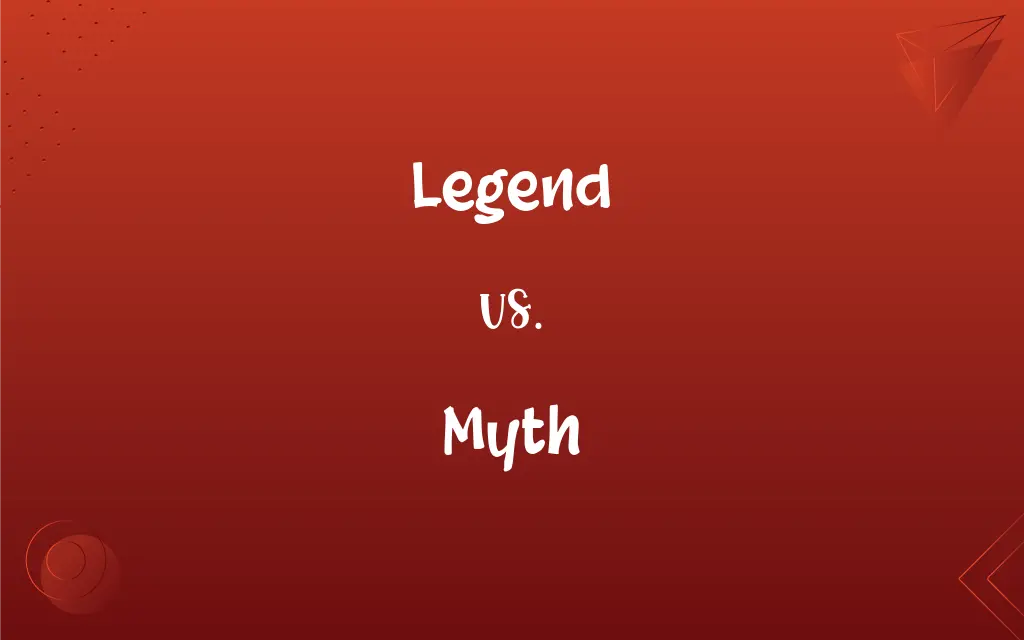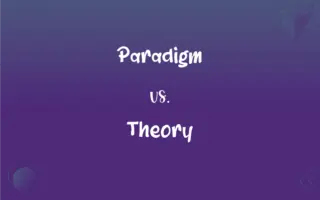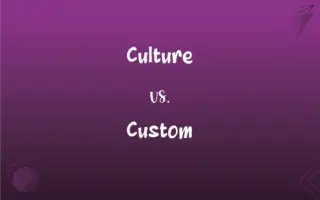Legend vs. Myth: What's the Difference?
Edited by Janet White || By Harlon Moss || Updated on October 18, 2023
Legend and myth differentiate as historical or traditional stories with the former often rooted in fact, while the latter often stems from cultural beliefs or supernatural origins.

Key Differences
A legend is typically a narrative or tale that, while based on historical events or real people, has been exaggerated or embellished over time. A myth, on the other hand, is a traditional story that often explains the beliefs, customs, or phenomena of a culture, often involving gods, supernatural beings, or ancestral heroes.
Legends often aim to convey moral lessons, celebrate heroes, or explain local traditions, and their narratives can change as they're retold over generations. Myths, conversely, serve a deeper cultural or religious purpose, providing insight into the values, beliefs, or cosmology of a civilization.
While legends usually revolve around heroic figures, battles, or significant events, they are often believed to have a kernel of truth to them. Myths, however, delve into the realm of the fantastical, frequently involving deities, creation tales, or explanations for natural phenomena.
It's crucial to note that legends are often specific to regions or communities, detailing events or figures important to that group. In contrast, myths can be more universal, spanning across various cultures, each with their own interpretation or version.
Although both legends and myths are integral to the cultural fabric of societies, their primary distinction lies in their origin and purpose. Legends usually have a foundation in reality, albeit exaggerated, while myths often emerge from the collective imagination, answering profound questions or illustrating moral values.
ADVERTISEMENT
Comparison Chart
Origin
Often rooted in historical events or real people.
Stem from cultural or supernatural beliefs, often involving gods or supernatural creatures.
Purpose
To convey moral lessons or celebrate local heroes.
To explain phenomena, beliefs, or customs; often has a religious undertone.
Truthfulness
Has a foundation in reality, though can be exaggerated.
More fantastical, not necessarily grounded in factual events.
Span
Specific to regions or communities.
Can be universal, found in multiple cultures with variations.
Typical Characters
Heroes, notable figures, sometimes supernatural elements.
Deities, ancestral heroes, creatures, and elements of creation.
ADVERTISEMENT
Legend and Myth Definitions
Legend
An inscription or title on an object, such as a coin.
The legend on the coin was worn out and barely readable.
Myth
A traditional story, especially one concerning early history or explaining natural or social phenomena.
The myth of Pandora's Box warns about the dangers of unchecked curiosity.
Legend
An explanatory list of symbols on a map or chart.
He referred to the legend to understand the map's symbols.
Myth
A popular misconception.
It's a myth that eating carrots improves your nighttime vision.
Legend
An inspiration; a model or prototype.
She is a legend in her own time, setting the standard for future athletes.
Myth
A widely held but false belief or idea.
The idea that you need 8 glasses of water daily is a myth.
Legend
A person whose fame or notoriety makes them a source of exaggerated or romanticized tales or exploits.
Michael Jordan is a legend in the basketball world.
Myth
A fictitious person or thing.
The hero in the story was just a myth, created to inspire the townspeople.
Legend
A traditional story believed to be historical but not verifiable.
The legend of King Arthur continues to captivate readers.
Myth
A person or thing held in awe or generally believed to have special powers or value.
To many, the ancient gods are myths, powerful beings from old tales.
Legend
An unverified story handed down from earlier times, especially one popularly believed to be historical.
Myth
A traditional, typically ancient story dealing with supernatural beings, ancestors, or heroes that serves as a fundamental type in the worldview of a people, as by explaining aspects of the natural world or delineating the psychology, customs, or ideals of society
The myth of Eros and Psyche.
A creation myth.
Legend
A body or collection of such stories.
Myth
Such stories considered as a group
The realm of myth.
FAQs
Can legends be true?
Legends often contain a kernel of truth, but details may be exaggerated or embellished over time.
Can a person be called a legend?
Yes, if their fame or achievements make them a source of exaggerated tales or exploits.
What's the primary difference between a legend and a myth?
A legend often has roots in historical events, while a myth stems from cultural beliefs or supernatural origins.
Can the term "legend" refer to text?
Yes, a legend can refer to an inscription or title on objects like coins.
Are myths purely religious stories?
While many myths have religious undertones, they aren't exclusively religious tales.
Is every historical story a legend?
Not necessarily. While legends have historical roots, they're characterized by exaggerations and embellishments.
Can myths be modern?
Yes, as cultures evolve, new myths can emerge reflecting contemporary beliefs or concerns.
Do legends have moral lessons?
Often, legends convey moral lessons or celebrate local heroes and traditions.
Can maps have legends?
Yes, in cartography, a legend is an explanatory list of symbols used on the map.
Are myths the same in every culture?
No, myths vary across cultures, though similar themes might exist with different interpretations.
Are legends limited to specific regions?
Typically, legends are specific to regions or communities, detailing local traditions or events.
Is every myth a lie?
Not necessarily. While myths aren't factual accounts, they represent cultural truths or beliefs.
Are all myths ancient?
While many myths have ancient origins, new myths can form in response to modern circumstances or beliefs.
Can legends change over time?
Yes, as legends are retold, details can change or be further exaggerated.
Can the term "myth" refer to a false belief?
Yes, "myth" can denote a widely held but incorrect belief or idea.
Are myths fictional stories?
Myths are traditional stories explaining cultural beliefs or phenomena, often involving the supernatural but aren't strictly "fictional."
Are myths always about gods and goddesses?
No, while many myths involve deities, they can also explain natural phenomena or cultural practices.
Why are myths important?
Myths provide insight into a culture's values, beliefs, and explanations for the world around them.
Do all legends involve supernatural elements?
No, while some legends may, many focus on historical figures or events.
Do myths serve a purpose?
Yes, myths often serve cultural, religious, or explanatory purposes.
About Author
Written by
Harlon MossHarlon is a seasoned quality moderator and accomplished content writer for Difference Wiki. An alumnus of the prestigious University of California, he earned his degree in Computer Science. Leveraging his academic background, Harlon brings a meticulous and informed perspective to his work, ensuring content accuracy and excellence.
Edited by
Janet WhiteJanet White has been an esteemed writer and blogger for Difference Wiki. Holding a Master's degree in Science and Medical Journalism from the prestigious Boston University, she has consistently demonstrated her expertise and passion for her field. When she's not immersed in her work, Janet relishes her time exercising, delving into a good book, and cherishing moments with friends and family.































































